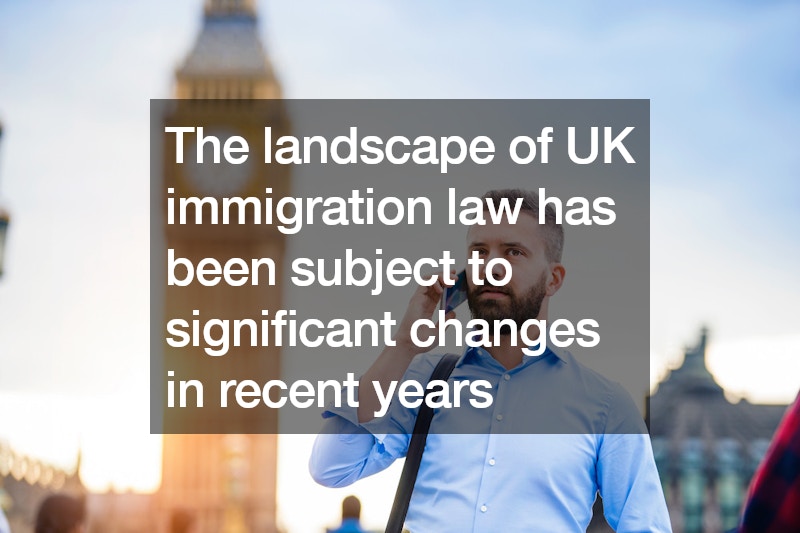The landscape of UK immigration law has been subject to significant changes in recent years, reflecting shifting political, economic, and social dynamics. These changes have profound implications for individuals seeking to enter or remain in the UK, as well as for businesses relying on international talent. To navigate this complex and evolving legal environment, many turn to immigration solicitors for expert guidance. This article delves into the impact of recent UK immigration law changes, offering insights from experienced immigration solicitors on how these changes affect various stakeholders.
Brexit and the End of Free Movement
One of the most significant changes in UK immigration law stemmed from Brexit. The UK’s departure from the European Union marked the end of free movement, which allowed EU citizens to live and work in the UK without needing a visa. As a result, EU citizens now face the same immigration requirements as those from outside the EU.
Impact on Individuals and Families:
For EU nationals residing in the UK, the introduction of the EU Settlement Scheme was crucial. This scheme allowed EU citizens and their families to apply and hopefully obtain a settled or pre-settled status. If approved, it will give them the right to continue living and working in the UK. Immigration solicitors played a pivotal role in assisting individuals with their applications, ensuring compliance with the new regulations and helping them understand their rights and entitlements.
Impact on Businesses:
For UK businesses, the end of free movement posed challenges in recruiting and retaining EU talent. Companies now need to navigate the UK’s points-based immigration system to sponsor skilled workers. Immigration solicitors assist businesses in understanding the new sponsorship requirements, obtaining sponsor licenses, and managing visa applications for their employees. This ensures that companies remain compliant with immigration laws while meeting their workforce needs.
The Points-Based Immigration System
The UK’s new points-based immigration system, introduced in January 2021, aims to attract skilled workers from around the world. Applicants must meet specific criteria, such as having a job offer from an approved sponsor, speaking English at a required level, and earning a minimum salary threshold.
Impact on Skilled Workers:
The points-based system prioritizes skills and qualifications, making it easier for highly skilled individuals to obtain work visas. However, it also sets higher barriers for those with lower skills or salaries. Immigration solicitors help skilled workers navigate the application process, ensuring they meet the necessary criteria and providing advice on how to maximize their points to secure a visa.
Impact on Sectors Facing Skill Shortages:
Certain sectors, such as healthcare and technology, face skill shortages that the points-based system seeks to address. Immigration solicitors work with employers in these sectors to streamline the hiring process for international talent, ensuring that the necessary documentation and compliance measures are in place.
Changes to Family and Humanitarian Immigration Policies
Recent changes have also affected family and humanitarian immigration policies. The UK government has implemented stricter requirements for family reunification, including higher income thresholds for sponsoring family members.
Impact on Families:
Families face increased challenges in meeting the financial requirements for bringing relatives to the UK. Immigration solicitors assist clients in preparing detailed applications, demonstrating their ability to support family members, and providing evidence to meet the stringent criteria. This support is crucial in ensuring that families can reunite and remain together in the UK.
Impact on Asylum Seekers and Refugees:
For asylum seekers and refugees, changes in immigration policies have introduced new hurdles in seeking protection in the UK. Immigration solicitors provide essential legal representation for these vulnerable individuals, helping them navigate the complex asylum process, gather necessary evidence, and present their cases effectively. Their expertise is critical in ensuring that those fleeing persecution and conflict can find safety and security in the UK.
The Role of Immigration Solicitors in Adapting to Legal Changes
In light of these significant changes, the role of immigration solicitors has become increasingly vital. Their expertise and experience provide clients with the necessary tools to navigate the complexities of the UK’s immigration system. Here are some key ways immigration solicitors support their clients:
Legal Expertise and Advice:
Immigration solicitors offer up-to-date legal advice on the latest changes in immigration law, helping clients understand their rights and options. They provide tailored guidance based on individual circumstances, ensuring that clients can make informed decisions.
Application Preparation and Submission:
Preparing immigration applications can be daunting, with strict requirements and detailed documentation needed. Immigration solicitors assist clients in compiling and submitting comprehensive applications, reducing the risk of errors and delays.
Representation and Advocacy:
In cases where applications are refused or complications arise, immigration solicitors provide representation and advocacy, appealing decisions and presenting cases to immigration tribunals. Their legal expertise is crucial in achieving favorable outcomes for clients.
Compliance and Risk Management:
For businesses, immigration solicitors help manage compliance with immigration laws, minimizing the risk of penalties and ensuring that sponsorship and employment practices adhere to legal standards.
Conclusion
The recent changes in UK immigration law have far-reaching impacts on individuals, families, and businesses. As the legal landscape continues to evolve, the role of experienced immigration solicitors remains indispensable. Their expertise and support are crucial in navigating the complexities of immigration regulations, ensuring that clients can achieve their goals and secure their futures in the UK. Whether dealing with the end of free movement, adapting to the points-based system, or addressing family and humanitarian immigration challenges, immigration solicitors provide essential guidance and representation in an ever-changing legal environment.
.




